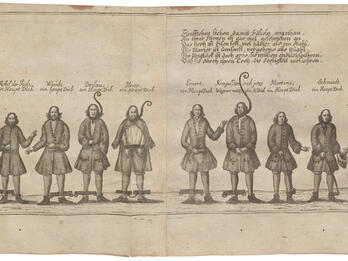Pinkas Lita (Register of Lithuania): On Itinerant Beggars
With regard to beggars who rise up and roam through the countryside (Job 1:7), walking through its length and breadth (Genesis 13:17). They come from a faraway land (Joshua 9:9) and spread out over the lands of Lithuania and Russia. They follow unpaved roads, turning aside along crooked ways (Psalms 125:5) in paths of darkness, and there is no light for them [see Isaiah 50:10] in their dark deeds. They are a burden on the state, eating from its bounty ever more greedily, and while this one is speaking, another one comes [see Job 1:13–18], and thus they are a burden that cannot be avoided. The more dishonest men dress in prayer shawls that are not theirs and in rabbinical cloaks, to preach publicly and offer religious instruction, whereas in actual fact, the contrary is the case: in his true self, he lies in wait for others (Jeremiah 9:7), he is full of deceit and there are seven abominations in his heart (Proverbs 26:25). They fill their stomachs with more than they can pay, and there are many who have been caught in houses of prostitution and in taverns, and numerous other sacrileges, which are unbearable to think of, and which should not be written down.
For this reason it has been proposed and concluded, on penalty of excommunication, ostracism, and a large monetary fine, set in accordance with the amount one can afford, that no one should give anything to any beggar in the world except for the Purim donation, and then one should send him away from there and onward. Likewise, one may not keep him in his house for more than a day. And no one should be permitted to preach in public, and if someone has the audacity to preach without permission, he shall be taken down with shame and contempt, unless he holds a letter of authorization from the head of a rabbinic court. That is to say, inhabitants of the vicinity of the holy community of Brisk shall request specifically a letter from the holy community of Brisk, and inhabitants of the holy community of Grodno—a letter from the holy community of Grodno, and inhabitants of the vicinity of the holy community of Pinsk shall entreat a letter from the holy community of Pinsk.
If the Jews do not have the authority to dismiss him and send him away with his hands tied, he must be expelled by a gentile. There is no sin or guilt in the matter, as our rabbis of blessed memory have already explained to us with their sweet tongue, when they said, “come and let us be grateful to cheaters.”1 One exception is a man who has redeemers and relatives here in the land of Lithuania and Russia. He should be examined by each and every head of a rabbinic court, to determine whether they are truly relatives, and if it is fitting to knock at their doors, as they have the wealth and means to help at his hour of need and provide proper assistance, so that it is worth his effort to ask them, then they may grant him permission to approach his relatives. If not, then the door should be closed to him, and he should not be allowed to set foot in any of the provinces of Lithuania and Russia. And every head of a rabbinic court is obliged to send an ordinance to their surrounding area, so that they will know about this and be warned. One who thinks that he will act mercifully and violate the words of this ordinance, he will be considered a sinner and shall suffer the punishments of excommunication, ostracism, and monetary fine, aside from other punishments and harassments.
Notes
[b. Ketubbot 68a; meaning that cheaters absolve us from the duty of giving charity to everyone who requests.—Trans.]
Credits
Published in: The Posen Library of Jewish Culture and Civilization, vol. 5.



